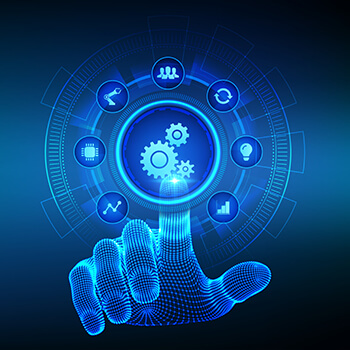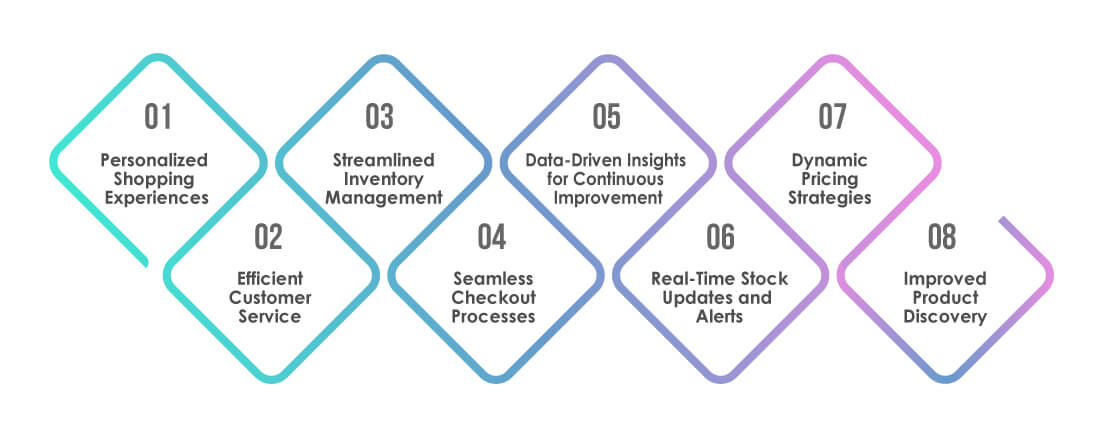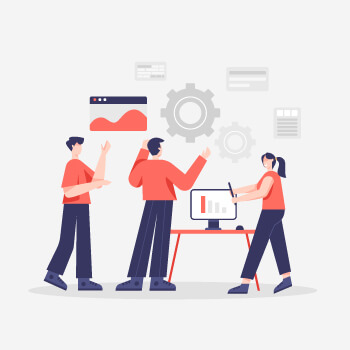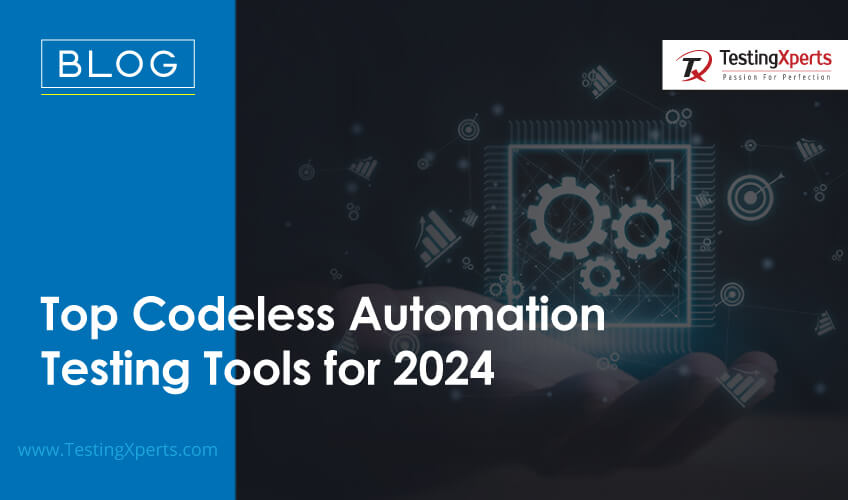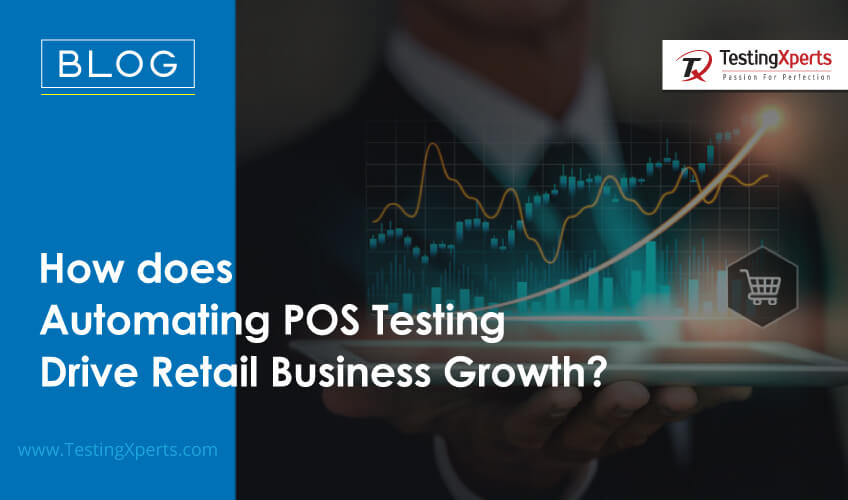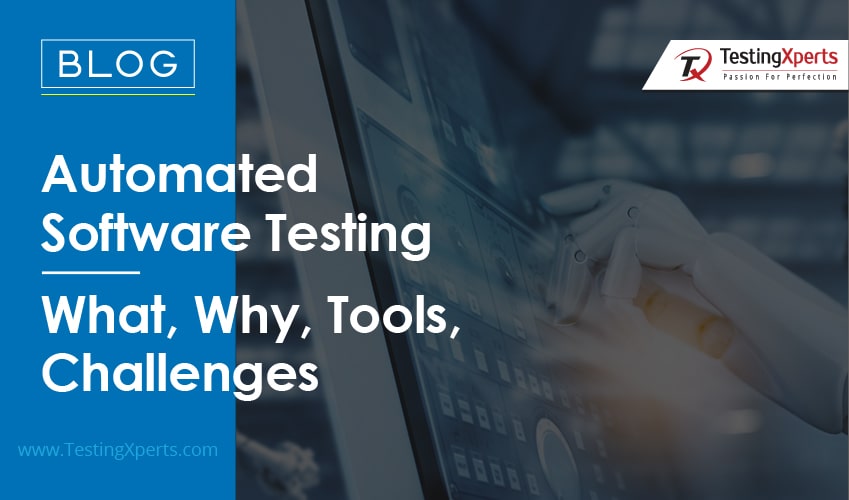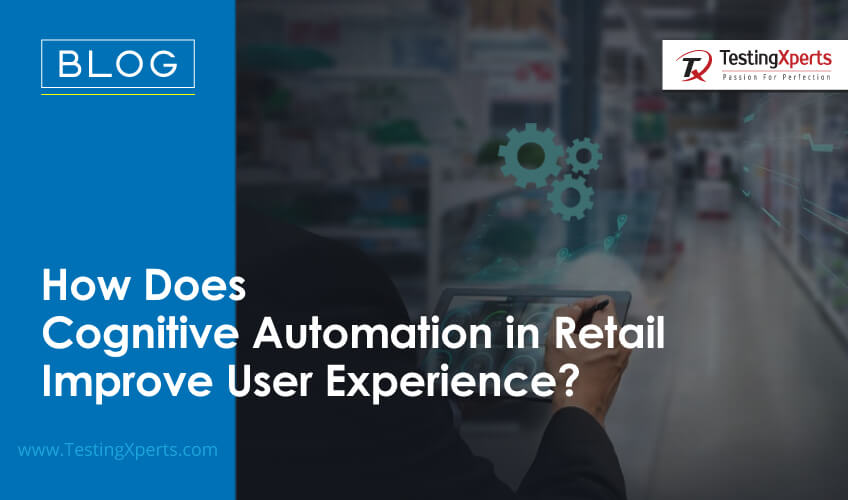
- Why Does Retail Need Cognitive Automation?
- Enhancing Retail User Experience with Cognitive Automation
- Cognitive Automation Use Cases in Retail
- Challenges and Considerations for Implementing Cognitive Automation
- Conclusion
- How Can TestingXperts Help with Retail Software Testing?
The importance of cognitive automation in retail cannot be ignored, especially while considering its market growth and adoption rate. The global market for cognitive process automation is expected to grow at a staggering compound annual growth rate (CAGR) of 27.8% from 2023 to 2030. Such growth indicates the increasing reliance on these technologies to improve retail efficiency, accuracy, and customer experience.
Furthermore, the broader cognitive automation market, encompassing various applications beyond process automation, is projected to reach approximately $36.09 billion by 2032, growing at a CAGR of 11.7% during the forecast period from 2023 to 2032. This growth is supported by integrating cognitive automation with other cutting-edge technologies like robotic process automation (RPA), the Internet of Things (IoT), and blockchain.
Why Does Retail Need Cognitive Automation?
The rapid expansion and adoption of cognitive automation in the retail industry highlights the necessity of understanding its impact on user experience. As retailers seek to stay competitive and meet evolving consumer demands, cognitive automation emerges as a crucial tool to enhance customer satisfaction and streamline operations. Since the beginning of the pandemic, the sector experienced a massive shift to online shopping, creating a strong market for e-commerce while putting brick-and-mortar outlets in doubt.
During all this disruption, retail organizations realized the need to streamline and standardize their processes, so employees could spend more time on tasks that matter – instead of investing their time and effort in manual labor. Nowadays, retailers are shifting from a reactive mindset to proactive, predictive and, ultimately, prescriptive by advancing their digital capabilities, including data, analytics, AI, automation and cognitive computing.
Let us understand in detail by differentiating Cognitive Automation vs. traditional Automation:
| Aspect | Cognitive Automation | Traditional Automation |
| Technology Base | Utilizes AI, machine learning, natural language processing, and data analytics. | Based on pre-programmed rules and simple algorithms.
|
| Learning Ability | Capable of learning and adapting from data over time. | Does not learn or adapt; operates based on fixed instructions. |
| Decision Making | Can make complex decisions by analyzing large data sets. | It is limited to decisions based on predefined rules. |
| Process Handling | Handles complex and variable processes, adapting as required. | It is best suited for repetitive, routine tasks with slight variation. |
| Data Processing | Can process unstructured data, like images and natural language. | Primarily processes structured data. |
| Integration | Easily integrates with other advanced technologies like IoT, blockchain, and RPA. | Integration is limited and often more straightforward. |
| Scope of Application | Broad and dynamic, applicable to a wide range of retail functions. | Generally limited to specific, well-defined tasks. |
| Impact on User Experience | Significantly enhances user experience by providing personalized services and real-time responses. | It improves efficiency but may not directly enhance the user experience. |
| Cost and Implementation | This may involve higher initial costs and complexity in implementation. | Relatively lower initial cost and simpler to implement. |
| Scalability | Highly scalable, can grow and adapt with the business. | The predefined rules and lack of adaptability limit scalability. |
Enhancing Retail User Experience with Cognitive Automation
By leveraging advanced technologies such as artificial intelligence (AI), machine learning, natural language processing, and data analytics, cognitive automation offers a level of interaction and personalization previously unattainable. This technology streamlines operations and deeply understands and responds to customer needs in real-time, significantly upgrading the shopping experience.
Here are some keyways cognitive automation enhances user experience in retail:
Personalized Shopping Experiences:
Cognitive automation enables retailers to offer highly personalized shopping experiences. This technology can provide tailored product recommendations and customized promotions by analyzing customer data, including past purchases, browsing history, and preferences. This level of personalization makes shopping more relevant and enjoyable for customers, increasing loyalty and satisfaction.
Efficient Customer Service:
With cognitive automation, retail businesses can deploy sophisticated chatbots and virtual assistants that handle customer inquiries and provide assistance 24/7. These AI-driven tools understand and process natural language, allowing them to interact with customers in a more human-like manner. This leads to quicker resolution of issues and queries, enhancing customer satisfaction.
Streamlined Inventory Management:
Cognitive automation optimizes inventory management by accurately predicting stock requirements, thus reducing overstocking or stockouts. This efficiency ensures that customers always find what they want, enhancing their shopping experience.
Seamless Checkout Processes:
Implementing cognitive automation reduces wait times and enhances efficiency. Automated checkout systems can quickly process transactions and even offer personalized discounts or recommendations, making the final stage of the shopping experience smooth and enjoyable.
Data-Driven Insights for Continuous Improvement:
Cognitive automation tools continuously analyze customer feedback and shopping patterns. This data-driven approach allows retailers to constantly refine and improve their offerings, ensuring that the user experience keeps getting better.
Real-Time Stock Updates and Alerts:
Cognitive automation systems can provide customers with real-time updates on product availability. This feature is particularly beneficial for online shopping, where customers can receive instant notifications about restocks or the availability of desired items, reducing the frustration of finding out-of-stock products.
Dynamic Pricing Strategies:
Leveraging cognitive automation, retailers can implement dynamic pricing strategies that adjust prices in real time based on demand, competition, and customer preferences. This approach ensures customers get competitive prices, enhancing their perception of getting value for money.
Improved Product Discovery:
Cognitive automation tools can analyze a customer’s browsing behavior and use this data to highlight products that align with their interests and needs. This targeted approach makes product discovery more intuitive and efficient, leading to a more satisfying shopping experience.
Cognitive Automation Use Cases in Retail
Cognitive automation powered by artificial intelligence, machine learning, and data analytics is transforming various aspects of the retail industry. From enhancing customer engagement to streamlining supply chain management, cognitive automation paves the way for smarter, more responsive retail operations.
Here are some impactful use cases of cognitive automation in retail:
Demand Forecasting and Inventory Optimization:
Cognitive automation is crucial in forecasting and inventory management. By leveraging AI and machine learning algorithms, it analyzes trends in market data, customer purchase histories, and seasonal demand patterns. This enables retailers to anticipate future product demands accurately, ensuring optimal stock levels. The result is a significant reduction in overstocking or understocking situations, leading to reduced operational costs and improved customer satisfaction. Retailers can thus respond swiftly to changing market dynamics, maintaining a competitive edge.
Personalized Marketing Campaigns:
Cognitive automation allows retailers to prepare highly personalized marketing campaigns. These systems can create targeted advertisements, personalized emails, and custom promotional offers by sifting through vast customer data, including past purchases, browsing habits, and preferences. This level of personalization leads to more effective marketing, higher engagement rates, and increased customer loyalty, as customers feel valued and understood.
Supply Chain Management and Logistics:
Cognitive automation significantly enhances supply chain management. It provides predictive insights into potential supply chain disruptions and optimizes logistics operations, including delivery route planning. These capabilities ensure a smoother, more efficient supply chain, which translates into quicker, more reliable delivery services for customers, enhancing their overall shopping experience.
Customer Feedback Analysis:
Analyzing customer feedback across various channels is streamlined using cognitive automation. Retailers can gain deep insights into customer preferences by processing large volumes of data from social media, customer reviews, and surveys. This analysis helps identify improvement areas, shape product development, and tailor services to meet customer needs more effectively.
Fraud Detection and Prevention:
In transaction security, cognitive automation is invaluable for detecting and preventing fraud. It analyzes real-time transaction data, identifying anomalies and patterns indicative of fraudulent activities. This proactive approach safeguards the retailer’s assets and protects customers from potential fraud, promoting trust and security in the retail environment.
In-store Customer Experience Enhancement:
In physical stores, cognitive automation contributes to a more engaging shopping experience through interactive kiosks, smart mirrors, and personalized recommendations. These technologies enhance the shopping experience by providing customers with interactive and personalized assistance, such as trying on clothes virtually or getting product information on the spot, leading to a more engaging and satisfying in-store experience.
Product Lifecycle Management:
Cognitive automation aids significantly in product lifecycle management. It gives retailers insights from market trends and customer feedback, informing decisions about product design, development, and discontinuation. This ensures that retailers can keep pace with market demands and customer preferences, making informed decisions that align with business goals and customer expectations.
Challenges and Considerations for Implementing Cognitive Automation
While cognitive automation presents numerous opportunities for the retail industry, its implementation comes with challenges and considerations. Retailers must understand these potential hurdles and plan to ensure the successful deployment and utilization of these advanced technologies. Addressing these challenges effectively often involves comprehensive testing strategies, which play a pivotal role in smoothing the transition and maximizing the benefits of cognitive automation.
Here are key challenges and considerations in implementing cognitive automation in retail, along with the role of testing in addressing these issues:
Integration with Existing Systems:
Integrating cognitive automation into existing retail systems is complex. It involves ensuring compatibility with legacy systems and aligning new technologies with current processes. Integration testing plays a crucial role here. Retailers can identify and resolve compatibility issues by systematically assessing how cognitive automation solutions interact with existing infrastructure. This testing phase helps fine-tune the integration process, ensuring a seamless transition that minimizes disruptions to ongoing operations.
Data Privacy and Security:
The heavy reliance on customer data in cognitive automation raises significant privacy and security concerns. Retailers must ensure compliance with data protection laws and safeguard against breaches. Security testing can help retailers strengthen their defences by simulating potential security threats and assessing the system’s response, ensuring customer data is securely handled and stored. This protects sensitive information and helps maintain customer trust and confidence.
Cost and ROI Concerns:
The financial aspect of implementing cognitive automation is significant for retailers. The initial investment can be considerable, and there’s a need to balance this with the expected ROI. Retailers can gain insights into their efficacy and cost-effectiveness by testing different automation solutions in controlled environments. This allows them to decide which solutions offer the best value and align with their financial goals.
Scalability and Futureproofing:
As businesses grow, their cognitive automation systems must scale accordingly. Testing for scalability is vital to ensure these systems can handle increased demand and adapt to future changes. This involves evaluating the system’s performance under various loads and conditions, ensuring it remains efficient and effective as the business expands and evolves.
Accuracy and Reliability of AI Algorithms:
The effectiveness of cognitive automation hinges on the accuracy of AI algorithms. Inaccurate or unreliable algorithms can lead to poor decisions and inefficiencies. Rigorous testing of these algorithms is necessary to ensure they operate as intended. This includes assessing data interpretation, decision-making accuracy, and the system’s ability to adapt and learn from new data.
Conclusion
Cognitive automation transforms the retail industry, offering unparalleled efficiency and enhanced customer experiences. By integrating advanced technologies like AI and machine learning, retailers can personalize shopping experiences, streamline operations, and respond to customer needs quickly and accurately. Adopting cognitive automation in retail optimizes inventory management and customer service and opens new avenues for engaging and retaining customers through personalized marketing and interactive in-store experiences. However, the implementation of cognitive automation is not without its challenges. Issues such as system integration, data security, and the need for continuous testing underscore the complexity of effectively deploying these technologies. Retailers must navigate these challenges thoughtfully, ensuring that the integration of cognitive automation into their operations is seamless, secure, and customer centric.
How Can TestingXperts Help with Retail Software Testing?
In the dynamic and competitive retail industry, where technology is rapidly evolving, TestingXperts is a crucial partner for businesses seeking specialized https://www.testingxperts.com/services/test-automation/automation testing solutions. Our expertise in automation testing for the retail industry ensures that your software systems are efficient and reliable and drive enhanced customer experiences and business growth.
Focused Automation Expertise:
TestingXperts brings focused expertise in automation testing specifically designed for retail. This includes testing point-of-sale (POS) systems, e-commerce platforms, supply chain management software, and customer relationship management (CRM) tools. Our deep understanding of retail operations enables us to create and implement effective automation testing strategies that align with industry-specific requirements.
Customized Testing Strategies:
We recognize that each retail business has unique needs. Our approach involves developing customized testing strategies catering to your business objectives and technological environments. This bespoke approach ensures more relevant and impactful testing outcomes.
Advanced Automation Tools and Frameworks:
TestingXperts utilizes state-of-the-art automation tools and in-house accelerators, such as Tx-Automate and Tx-HyperAutomate, to deliver efficient and accurate testing results. Our use of the latest technologies in automation testing not only speeds up the testing process but also enhances the accuracy and reliability of the tests.
Enhancing User Experience:
Understanding the importance of user experience in retail, our automation testing focuses on optimizing the user interface and overall functionality of retail applications. This ensures a seamless and enjoyable shopping experience for your customers, which is crucial in building loyalty and driving sales.
Scalability and Performance Testing:
In the fast-paced retail industry, scalability and performance are key. Our testing ensures that your applications can handle peak loads, especially during high-traffic periods like sales or holidays, ensuring uninterrupted service and a smooth customer experience.
Integration Testing for Omnichannel Retailing:
With the rise of omnichannel retailing, ensuring seamless integration of various applications and platforms is crucial. TestingXperts specializes in integration testing, ensuring that all components of your omnichannel strategy work harmoniously, providing a cohesive experience across all channels.
Data-Driven and AI-Enhanced Testing:
Leveraging data analytics and AI, we bring a more intelligent approach to automation testing. This enables predictive insights and more sophisticated test scenarios, ensuring the software is robust and prepared for real-world retail challenges.
Continuous Testing for Continuous Deployment:
We offer continuous testing services in line with agile methodologies. This facilitates continuous deployment and integration, allowing for rapid iteration and updates to retail software, keeping you ahead in a fast-changing market.
Compliance and Security Testing:
Recognizing the critical importance of data security and regulatory compliance in the retail industry, our automation testing includes rigorous security and compliance checks. This ensures that your retail software is efficient but also secure and compliant with industry standards and regulations.
To know more, contact our QA experts now.
Discover more
Get in Touch
Stay Updated
Subscribe for more info

